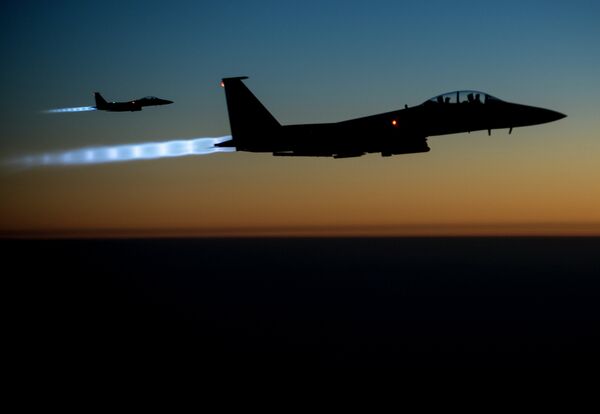MOSCOW, September 26 (RIA Novosti), Ekaterina Blinova - The US military campaign to eradicate the Islamic State will only gain success through close collaboration with Iran, its main rival in the region, experts say.
"If President Obama truly wants to degrade and destroy the Islamic State, he must find a way to collaborate with Iran — the one great power in the Middle East with which the United States is still at odds. Engagement with Iran — while hard and complicated — would be a strategic game-changer, with benefits spreading from Iraq to Syria to Afghanistan," writes Fareed Zakaria, an American journalist and author, in his op-ed, "The fight against the Islamic State must include Iran", which was published by The Washington Post on September 25.
Aside from the fact that Iran is one of the most active antagonists of the extremist ISIS regime, Tehran has a strong influence on the Iraqi, Syrian and Afghanistan elites, the journalist stresses. According to Fareed Zakaria, Iran may assist the US with mediating between Sunni Muslims and Shiites in the region, as well as make a power-sharing deal with Syria's authorities, in order to remove Bashar al-Assad's regime peacefully. In Afghanistan, Iran could also become a "major stabilizing force," by closely cooperating with the White House, underscores Mr. Zakaria.
It is worth mentioning that the idea of US-Iranian collaboration in the Middle East became a leitmotif of Iranian President Hassan Rouhani’s speech to the United Nations General Assembly on September 25, Edward Wastnidge, a Lecturer in Politics and International Studies at The Open University, wrote in The Conversation, a London-based media source.
"With instability plaguing the Middle East since the emergence of the Islamic State (IS), Iran is once again faced with spiraling instability and Western military interventions just across its border. It also finds itself running out of time in crucial nuclear weapons negotiations, with only weeks to go before the deadline to strike a deal," Wastnidge stressed.
On the one hand, the Iranian authorities, including Ali Hosseini Khamenei, Supreme Leader of Iran, are expressing their deep discontent over the US "re-entry" into Iraq.
If the US enters #Iraq & #Syria without permission, they will go through the same problems as they did over the past 10 years in Iraq.
— Khamenei.ir (@khamenei_ir) September 15, 2014
On the other hand, however, Tehran hopes to accelerate deal-making on Iran's nuclear program, by offering Washington its help in fighting ISIS and eradicating the terrorism in the region, experts point out.
"On Wednesday in New York, Iranian President Hassan Rouhani offered to help the West fight terrorism—and play a more "active role" in the Middle East—as long as the West is willing to do it Iran’s way and also come to a deal on its nuclear program," The Daily Beast notes.
While Wastnidge believes that "Western-Iranian relations are continuing to thaw rather than freeze" and that this "thaw" might be "paradoxically hastened" by the Middle Eastern conflict, the Guardian stresses that it's highly doubtful that US will invite Iran to take part in its military operation anytime soon.
"US officials acknowledged the US could not consider inviting Iran in order to preserve the key Saudi participation in combating ISIS," the Guardian emphasizes.
Experts note that Iran, a Shia state, still remains the Gulf monarchies' geopolitical rival. Furthermore, Saudi Arabia and the Gulf states consider the war in Iraq and Syria to be their chance to maintain influence in the region.
"The Saudis, the leader among monarchies, no doubt helped bring its tiny neighbors along to bomb Syria, which Saudi Arabia still very much views as a sectarian proxy war," writes the Guardian.
However, since the Iraqi Shia political elite is dependent on its Tehran "patrons," Obama will apparently need Iran's assistance to control the political situation in Baghdad, Wastnidge notes.

